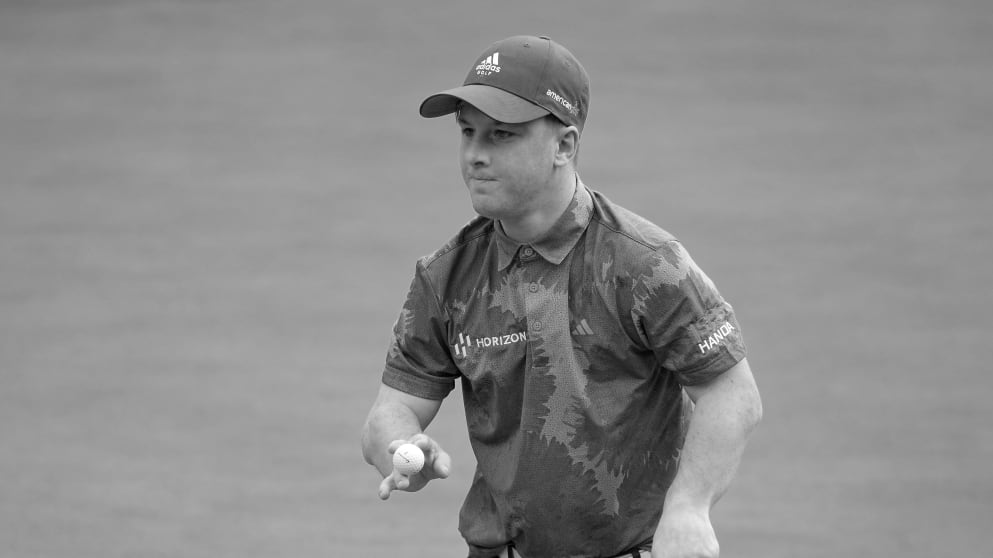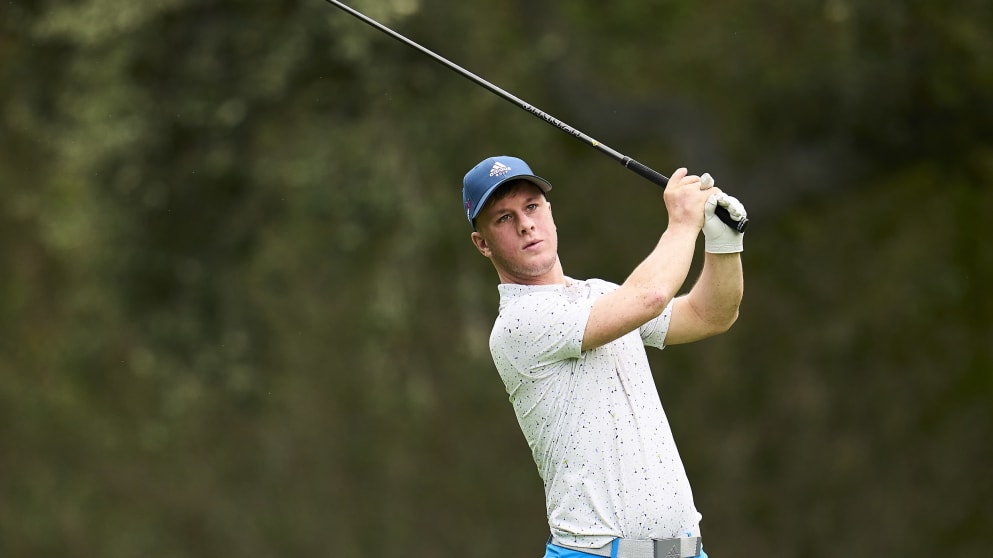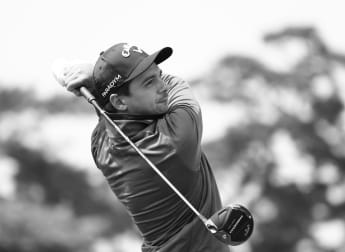Ahead of this week’s inaugural G4D Open, Brendan Lawlor talks about being an advocate for golf for the disabled, addressing negative comments on social media, and his motivation to get back in to the winner's circle.

Last week I decided to use my platform to highlight some negativity that came my way on social media in the hope we can continue to break down barriers in golf for the disabled, and I just can’t get over the reception it got.
I’ve grown up with comments like this my whole life, and it’s never affected me. My disability has never been an insecurity to me, and I’ve always been like that. Even when people would look in shopping centres it would never annoy me because I just assumed it was because I was looking confident or something.
But what upsets me is that my family had to read the negative comments, and that it might affect other people. They’ve always done a great job because they’ve normalised my life in every way, and I don’t like that they have to see that. It actually only came about because my brother had reluctantly text me asking if I’d seen the comments and suggested it would be a good idea to address the negativity. So I got onto my management at Modest! Golf and we decided to do something because I think if you have a voice and you have a platform, it’s important to use it.
Disability golfer @BrendanLawlor97 has addressed online abuse he’s received after his participation at the ISPS Handa Championship last month.
— DP World Tour (@DPWorldTour) May 4, 2023
Keep breaking down barriers, Brendan 👏pic.twitter.com/69jxZD4tkH
I just thought with what we’ve done in the last few years to grow inclusion in the sport it was a barrier that needed to be highlighted at some stage. And with the recognition I got after getting that start in Japan on the DP World Tour – which was a huge step forward for golf for the disabled – I felt it would be a good time to highlight it because other people will get these opportunities and if you aren’t mentally strong enough it would be hard to take this criticism.
Putting those comments together and seeing them all together on a picture doesn’t annoy me, but it could annoy and affect some people and that’s why I did it. Especially with the way things are going, a lot more players are going to pick up more exposure on big social media platforms and I wanted to highlight a coping mechanism so that stuff like that wouldn’t bother them, because it shouldn’t. I really wanted to show people the sorts of comments you get, whether you are short in stature or have one leg, that it’s another barrier we are facing that could be quite damaging. All we are trying to do is grow a sport that we play. We are normal people with the same thoughts and the same feelings, we just have a small difference because of something we were born with – but everything else is the same. We are just trying to do the same things people without disabilities do, and if we can highlight the issue, then hopefully it will help somewhere and remind people that, disability or not, we all have feelings.
I got a lot of private messages including a really nice one from Shane Lowry who said it was great that I was speaking out and that I had a lot of people who admire me. Then I had support from Tyrrell Hatton, Thomas Bjørn, and Justin Thomas followed me and liked all the stuff. It’s really a great honour for them to see it happening and give you support because it gives other people support to keep going. Then when you have Niall Horan on your side, whatever he posts really hits home and it was in all the newspapers on Friday in Ireland that Niall Horan supports Brendan Lawlor’s vision in trying to make golf for the disabled more acceptable.
And while all of that is great, I don’t do this for recognition, I’m just doing it for awareness. I’ve managed to naturally fall into this advocacy role in our sport and I love talking about golf for the disabled. I just want to get more people into the game, and what I don’t want is people to be discouraged by doing that when they see negativity.
Some people asked me last year if I wasn’t playing as well because I was taking on too much responsibility trying to be the leader, but I do it because I enjoy it. Last year I was putting too much pressure on myself to perform and the year before I felt the wins were coming naturally. But in my last few events I’m getting closer and closer that headspace, so if I can bring that headspace into disability events I feel very, very close to something special.
I actually spoke to Rory McIlroy about it when I played with him and Shane in Dubai. I told him how motivated I was to be the best. I’m still motivated, but I just don’t have my best. He said he was the exact same, and that he had to lose it to get his motivation back. And I’m in a place now where I know I need to work harder because more players are coming in to the game and Kipp and Juan – some of the best players in the world – it’s just motivating me to get better and play better.

As a disabled golfer, I know I am in the position I am in because I have those disabilities, and that’s where we are trying to make a difference. It’s really special to play in DP World Tour events like Japan, but I also know that my niche is golf for the disabled, that’s where I am doing things others can’t do and that makes us special. I always say to Juan Postigo and Kipp Popert we need to stay in our niche and keep pumping out the message, and that’s where we can help grow and advocate for our game. We just want to encourage more people into the sport. My mum was reluctant to tell me about it when I started because I would be categorised as having a disability and I’d never been categorised before. But I think with what the DP World Tour are doing, and what we are doing, it’s becoming the norm. We don’t want people to have shame in saying they have a disability. We want it to become the norm and the sport to become something big. There are millions of people in the world who have a disability, it’s just getting them into the sport. In our sport we are big fish in a little pond, and in Japan a couple of weeks ago I was surrounded by many fish that ate me up. I think it’s important to know where you fit in the world, and I think we are fitting in pretty well at the minute doing what we do.
Being a role model is definitely not something I envisaged happening when I took up golf, but I love what I do, and we have changed so many lives along the way – not just when it comes to golf, and that’s why all of this is so important. You take up the game for the love of the game, and then with golf I’ve fallen into different stages. At the start I was tunnel vision on wanting to win everything – and I still do – but when the messages start flowing in you start being an ambassador and role model and it’s a beautiful thing.
When I was born social media wasn’t a thing and mum didn’t have anyone to talk to about my condition because no one in the world had it or she couldn’t get in touch with anyone. Since golf for the disabled started several people with the same condition as me from Ireland, Spain and even America have got on to me. We’ve set up calls with the parents to give them a whole life cycle of health about how it’s going to go, what operations they might have, all about their fingers and more. It’s a beautiful thing to have someone to fall back on to make sure their children have a lovely clear path, and it shows the good that social media can do when it’s not filled with awful comments.
And it’s not just people with my condition. Sometimes it’s young girls who struggle badly with mental health, and others who ask if they should talk up golf or for general advice about disabilities. I love people coming to me, it’s great, and if we can get more people in to the sport too then ever better. One guy that came to me from Ireland, Connell Flynn, who has dwarfism, is getting into the game and we are going to get him fitted up at the range with some clubs. I also give him shoes because I’m only a size three!
Not the week he wanted, but five time G4D Tour winner @BrendanLawlor97 hits the pin at the 7th! 🎯#ISPSHandaChampionship pic.twitter.com/GlQgVg4AM2
— DP World Tour (@DPWorldTour) April 21, 2023
I’m very motivated right now and I’m putting in some serious work because the G4D Open this week is a pretty big deal. It’s a huge motivation for people that they have the chance to be the first one to win it, so I think you’ll notice that it’s going to be very, very competitive. With such a big field and so many disability categories, there are also so many opportunities to highlight our sport with this event, and I’m really excited. We have a really strong community, particularly on the G4D Tour already, and this event is going to help bring more and more people together in that unity as well – and hopefully it will also help get more disability golfers into the G4D circuit too.
I was checking the entry list and I think there are like 35 players entered to play their first ever disability event so it’s going to be a big deal. There’s going to be 80 players with a whole diverse range of different disabilities and that’s the beautiful thing about it. Golf is fully inclusive and the DP World Tour are doing fabulous thing, but if we can get more disability golfers into that circuit playing on a Monday and Tuesday it would highlight the sport even more. It’s going to be a ground-breaking event, and hopefully it will help push our message forward.






